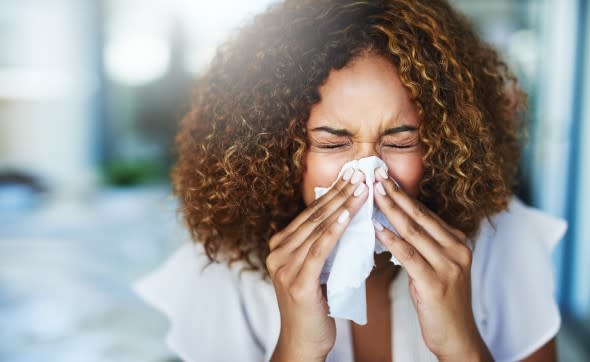Why the flu virus tends to spread more rapidly among college students
Flu season can be a major inconvenience, especially for busy college students.
For many college students who are away from home for the first time, getting the flu and taking care of themselves is uncharted territory. The fear of missing precious class time or going out with friends also weighs into the equation.
"It is pretty easy to spread from person to person by air if you sneeze or you sneeze on somebody else," said Ebbing Lautenbach, chief of the Infectious Disease Division at the University of Pennsylvania. "It is very easy to transmit by your hand or surfaces."
Lautenbach said that it takes very few viral particles to infect someone with the flu. Without proper hygiene and knowledge, students can see the spread of flu within their friend groups or throughout their college dorm.
It is important for students to know that these particles can be anywhere on entire campus whether they are in class, at a sporting events, in the dining halls or at a downtown gathering place.
"There are a lot of shared common areas, not only do you have a roommate or roommates, you share a fairly small area that makes it more likely for you to pick up things off of inanimate objects," said Lautenbach. "There is also more handshaking, high fives, or sharing drinks and things like that."

(Photo/PeopleImages/Getty Images)
College students make their bodies more susceptible to the flu without even knowing it, with differences in their daily routines and new, possibly unhealthy habits. Some of these changes include not eating well and lacking proper nourishment, or not in-taking enough water leading to dehydration. Stress, emotionally and physically, can also tire the body and make bodies vulnerable to viruses.
One of the biggest struggles of college students, which can probably be labeled as a contributing factor in students contracting the flu virus, is sleep deprivation.
"College students often put themselves at risk of the flu and other respiratory illnesses by not getting enough sleep," said Robert M. Jacobson, M.D., medical director of the Mayo Clinic's primary care immunization program. "Pulling all-nighters to catch up on studies, staying up late on Friday and Saturday to recreate and relax with their friends often puts their bodies at higher risk to catch an infection. They end up leading a lifestyle that runs their bodies down."
Rest is not only important in preventative measures, but it is even more important when you suspect you have the flu. It is advised you go to the doctor rather than try to tough it out going to class.
"If you start to feel sick, you have a fever, you have a cough, feel aches, chills and things like that, go to student health because they can do a rapid flu test," said Lautenbach. "If that test is positive in the first 48 hours of symptoms, then there are medicines that can help you shorten the duration of symptoms but also prevent some of the worst outcomes that can happen."
Over-the-counter cold medicines, acetaminophen and ibuprofen can help to alleviate symptoms and pain. Listening to suggestions by the doctors is important to ensure a speedy recovery.
RELATED:
Why children are at risk for dangerous complications from the flu
What you need to know for 2018 flu virus season
How does cold weather impact the spread, survival of the flu virus?
How can you try to protect yourself from getting the flu in the first place? There is only one thing you can try: a flu shot.
A fault of many college students is not getting the flu vaccine on their own. Whether it is not knowing where it is offered or if it is available to them, students should know that they can and should get vaccinated while at school.
"College students don't get vaccinated for the flu a whole lot," said Lautenbach. "Compared to the general population, partly because they're otherwise generally young, healthy people, they tend not to get the flu shot a lot which is the best way to prevent the flu."
The flu doesn't discriminate, meaning anyone can get the flu no matter how healthy they are or what preventative precautions they have taken.
Getting the vaccine not only lessens your chance of becoming ill, but the symptoms you experience if you do get the flu will be significantly decreased if you received the vaccine. As the years pass and a new flu season comes along, the idea is that your body will be better equipped to handle whichever strain of flu is floating around that season as a result of getting your yearly shot.
Some students will choose to wait until they visit their primary care physician to get the vaccine. Students do not always realize, however, that when they go home to their family and friends they could be bringing the virus into their home, or their home may be giving them the virus to bring back to college.
"When they do visit for fall break or Thanksgiving break, the last thing on their mind is stopping by the doctors and getting a vaccine," said Jacobson. "When the colleges make it available in student health, the students should jump to get it. It's the same vaccine that their doctor back home would be offering."
If your student health center is not offering flu shots or does not have easy access to appointments, CVS Pharmacy, Walgreens and express medical services are some alternative resources for getting a flu shot relatively close to campus. A quick internet search should be able to find the closest location to get a flu shot.
"It's never too late to get the flu shot," said Lautenbach. "The sooner they get the flu shot the better."
For more safety and preparedness tips, visit AccuWeather.com/Ready.

